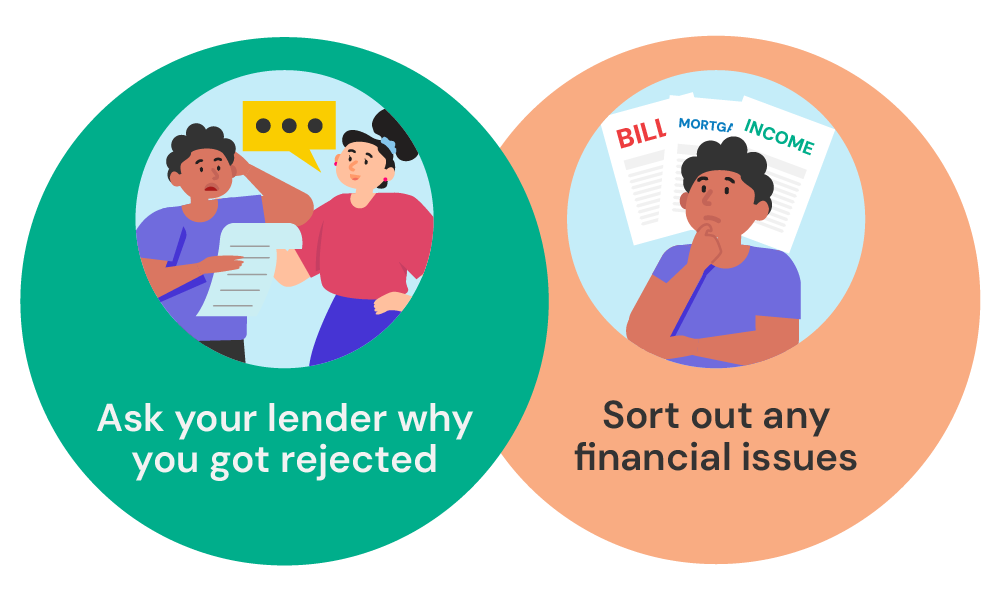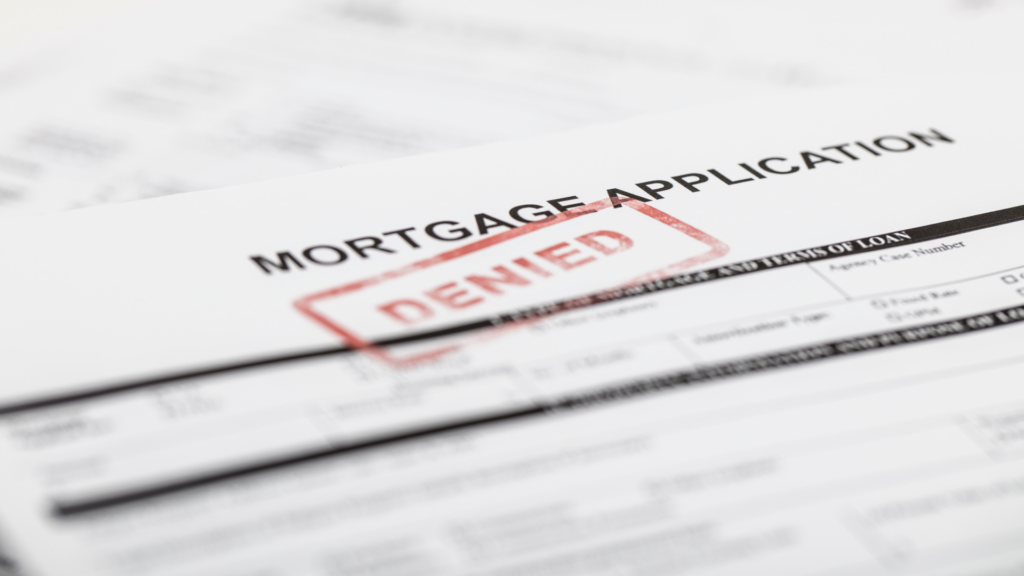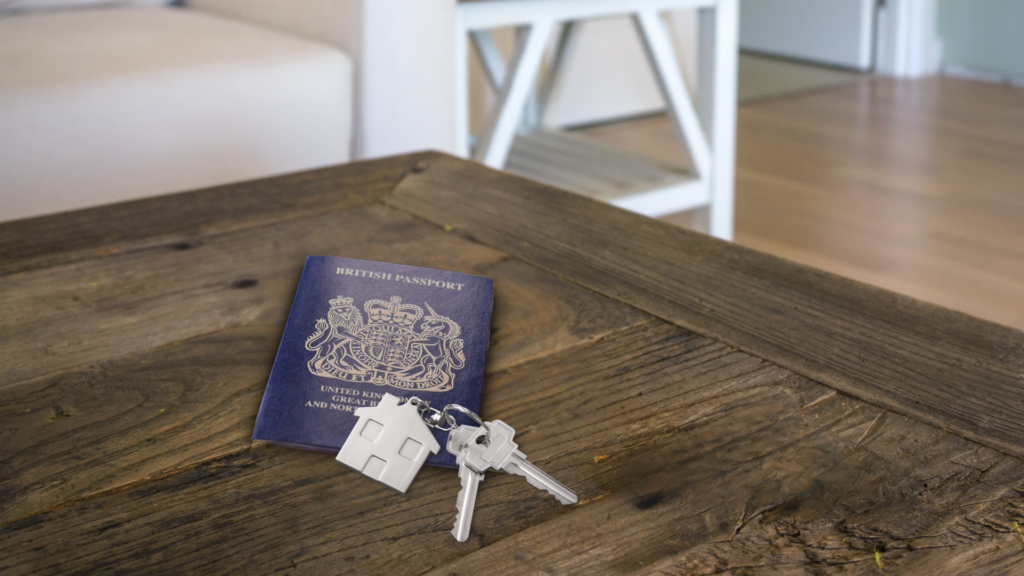Can’t Get a Mortgage? Here’s What You Can Do

You’re ready to step onto the property ladder, but then it happens.
The rejection. No mortgage for you.
It feels like a dead end, doesn’t it?
But here’s the thing: it’s not.
Many people who think they can’t get a mortgage actually can. It’s often just a matter of understanding the mortgage process and being prepared.
This article will explore common reasons why mortgage applications are rejected and offer guidance on securing the finance you need.
What Should I Do If I Can’t Get a Mortgage?
First things first, don’t panic.
If you’ve hit a roadblock in your mortgage journey, the key is to understand why.
Maybe it’s your credit score, maybe it’s the property, or maybe it’s something else entirely. The important thing is to get specific.
Vague reasons like “house prices are too high” won’t get you anywhere. You need clarity to move forward.
Identify the Root Cause
Start by pinpointing exactly why you were declined or why you think you won’t be approved.
Is it your financial history? Your income? Or perhaps something about the property itself?
Until you know the real issue, you’re stuck.
Seek Expert Advice
This is where a good mortgage broker comes in.
They know the landscape, they know the lenders, and they can offer advice tailored to your situation.
A good broker with access to the whole market can uncover options you might not find on your own.
Find a Solution
Once you know what’s holding you back, work with your broker to find a way forward. Sometimes it’s as simple as trying a different lender.
Other times, it might mean improving your credit score or saving for a bigger deposit.
Whatever the challenge, there’s usually a way to overcome it.

Why You Think It’s Hard to Get a Mortgage
Bad Credit History
A poor credit history—yes, it’s a hurdle. But it’s not the end of the road.
If you’ve missed payments, defaulted on a loan, or had a County Court Judgment (CCJ) against you, mainstream lenders might label you as high-risk and shut the door.
But here’s the thing: bad credit doesn’t automatically disqualify you from getting a mortgage.
Specialist lenders exist for exactly this reason. They’re not interested in blanket judgments.
Instead, they’ll dig into the details—how severe were those credit issues? How long ago did they happen? Were there any exceptional circumstances?
They look beyond the numbers.
So, how do you improve your chances?
- Check Your Credit Report – Before you even think about applying, get your hands on a copy of your credit report from Equifax, Experian, and TransUnion. Scan it for errors—yes, they happen—and get them corrected.
- Improve Your Credit Score – If you’ve got time, work on boosting that credit score. Pay off existing debts, make sure every payment is on time, and show lenders you’re serious.
Your credit history doesn’t have to be a dead end. It’s just one part of the story.
Self-Employed
There’s a myth floating around that self-employed people can’t get a mortgage. But that’s all it is—a myth.
Yes, the process can be more complex, but most lenders are open to self-employed applicants.
The real difference? It’s how they assess your income.
For someone on payroll, it’s simple: hand over a few recent payslips, and you’re done.
But for the self-employed, with incomes that can swing up and down, lenders want a clearer picture.
Typically, they’ll ask for two years of accounts or tax returns.
But here’s the good news: some lenders will consider just one year’s accounts, and a few might even accept less under the right circumstances.
So, if you’re self-employed and finding it tough to secure a mortgage, here’s what you can do:
- Keep Detailed Records – Make sure your accounts are up to date and accurately reflect your earnings. The smoother the records, the smoother the process.
- Use a Specialist Broker – A broker who understands the self-employed landscape can be a game-changer. They know which lenders are more flexible and can help you find the right fit.
Being self-employed doesn’t have to mean being shut out of the mortgage market.
You’ve just got to know where to look.
Age Concerns
Age isn’t a deal breaker when it comes to getting a mortgage. While lenders have maximum age limits, they’re not set in stone.
The rules vary widely.
Some might cap the age at application—anywhere from 55 to 89. Others look at the age at the end of the mortgage term, usually between 70 and 95.
And then there are those who don’t set a maximum age at all, as long as you can show you’ve got the income to cover the repayments, even into retirement.
So, if you’re an older borrower finding it tough to secure a mortgage, here’s what to do:
- Explore Different Lenders – Don’t assume every lender will say no. Shop around, or better yet, work with a broker who knows which lenders are more flexible with older applicants.
- Consider Retirement Income – Be ready to demonstrate how you’ll keep up with repayments using your pension or other retirement income.
Age isn’t a barrier; it’s just another factor. You’ve still got options—more than you might think.
Low Income
Low income can make getting a mortgage trickier, but it doesn’t make it out of reach.
Many believe there’s a one-size-fits-all minimum income threshold, but that’s not quite right.
Lenders have their own rules.
Some set a minimum, typically between £13,000 and £25,000. Others don’t bother with a set figure at all.
But here’s the thing: your income does dictate how much you can borrow.
Most lenders will offer you between 4.5 and 5 times your annual income. So, if the mortgage offer isn’t quite enough to get the property you’re after, don’t lose hope just yet.
Here are ways to borrow more and improve your mortgage approval chances:
- Additional Income Sources – Some lenders will take into account more than just your salary. Think bonuses, commissions, benefits, or even rental income from a lodger. Make sure you disclose all your income when you apply.
- Joint Applications – If you’re buying with a partner, pooling your income can bump up the amount you’re able to borrow.
Low income doesn’t close the door—it just means you might need to look at a few different keys to unlock it.
Low Deposit
For first-time buyers, the idea of saving up a hefty deposit can feel like an uphill battle.
The common wisdom says you need at least 10% to get the best mortgage deals.
And yes, with that, you’ll likely unlock lower interest rates and more favourable terms. It’s a solid target if you’re planning to buy.
But here’s the truth: if that 10% seems out of reach, all is not lost.
While a bigger deposit does open more doors, some lenders are still willing to offer you a mortgage with just 5% down.
These 95% LTV (Loan-to-Value) mortgages are designed for those who have less upfront but are keen to make that first step onto the property ladder.
Just be aware, these deals might come with higher interest rates and fewer choices.
So, what can you do if you’re in this situation?
- Consider a 95% Mortgage – With a 95% mortgage, you only need a 5% deposit. This means if you’re buying a £200,000 home, you’d need a £10,000 deposit. Keep in mind, though, that these mortgages often come with higher interest rates.
- Government Schemes – The Mortgage Guarantee Scheme helps people with smaller deposits get a mortgage by providing lenders with a government-backed guarantee. It’s available until June 2025, so check with your lender or broker for the latest details.
Unmortgageable Property
Sometimes, it’s not about you—it’s about the property.
When a property is labelled “unmortgageable,” it usually means it doesn’t tick the boxes for standard lending criteria.
Maybe it’s missing a roof, doesn’t have a functioning bathroom, or is made of something unconventional, like timber or concrete.
But here’s the thing: just because one lender says no, it doesn’t mean they all will.
Some lenders specialise in financing the less-than-standard, the quirky, the unconventional.
So, if you’re hitting a wall because of the property, here’s what you can do:
- Look for Specialist Lenders – There are lenders out there who thrive on the unusual. They specialise in non-standard constructions and unique properties. A good broker can point you in the right direction.
- Consider Alternative Financing – If the property is truly uninhabitable, a bridging loan could be a stopgap. It gives you the time to bring the property up to scratch, so you can then apply for a traditional mortgage.
Unmortgageable doesn’t mean impossible. It just means finding the right angle, the right approach, and the right lender who sees the potential you do.
Complex Financial Situation
When your finances are complicated, getting a mortgage can feel like trying to fit a square peg into a round hole.
Multiple income streams, self-employment, owning a business, or holding significant investments—these aren’t the neat and tidy situations that standard lending criteria are built for.
Lenders like things simple: steady income, clear accounts, and straightforward assets. But your financial world? It’s anything but simple.
So, what’s your move?
- Work with a Specialist Broker – A broker who gets the nuances of complex finances can be your secret weapon. They know which lenders are open to more intricate situations and how to present your financial picture in the best possible light.
- Gather Comprehensive Documentation – Be ready to lay it all out—tax returns, business accounts, investment statements, and anything else that tells your financial story. The clearer the picture, the easier it is for a lender to see your potential.
- Explore Lenders Who Understand Complexity – Some lenders thrive on the non-traditional. They’re used to working with business owners, investors, and anyone whose finances don’t fit the usual mould. The right broker can introduce you to these lenders.
Existing Debts
Sometimes, the hurdle isn’t your income or credit score—it’s the debt you’re already carrying.
When lenders see personal loans, credit card balances, or car finance in your financial mix, they get cautious. It’s not that debt is a dealbreaker; it’s how that debt affects your overall affordability.
If too much of your income is tied up in repayments, lenders might worry that adding a mortgage could stretch your finances too thin.
But here’s the good news: having existing debt doesn’t automatically slam the door on getting a mortgage.
It just means you need to be smart about your approach.
- Manage Your Debt-to-Income Ratio – Lenders look closely at how much of your income goes towards debt—your DTI ratio. Most prefer it below 36%, though some might go up to 50% depending on your financial health. If you want to see where you stand and explore your options, use the calculator here. And if your ratio’s high, think about paying down debt before applying. It could be the difference between approval and rejection.
- Seek Out Flexible Lenders – Some lenders are more understanding, especially if you’ve shown you can handle your debt. A good broker can help you find these options.
- Present a Strong Application – A solid credit score, savings, and job stability can tip the scales in your favour, even with some debt on your plate.
Debt doesn’t have to be a dealbreaker. It just means you need a strategy.
Limited UK Address History
Your address history is more important than you might think when applying for a mortgage.
Lenders use your address history to assess your stability and to track your credit history.
If you’ve recently moved to the UK or haven’t been in one place for long, this can be a red flag for some lenders.
They might see it as a lack of stability or worry that they can’t get a full picture of your financial behaviour.
But don’t let a short address history put you off. Here’s how to tackle it:
- Find Flexible Lenders – Some lenders are more understanding of a limited UK address history, especially if you’ve got a stable job and strong finances. A good broker can help you find them.
- Provide Extra Evidence – If your address history is brief, bolster your application with other signs of stability—like a long-term employment contract or proof of consistent rent payments. The more you can show you’re a low-risk borrower, the better.
- Consider a Guarantor – In some cases, having a guarantor—someone who agrees to step in if you can’t make payments—can ease a lender’s concerns about your short address history.
Unusual Property Types
Unusual properties—whether it’s a timber-framed house, a flat above a shop, or a fixer-upper—don’t always fit the standard lending criteria.
Lenders get wary about non-standard construction or properties that might be tricky to sell if they need to recoup their money.
But a unique property doesn’t mean a dead end for your mortgage dreams. Here’s how to move forward:
- Look for Specialist Lenders – Some lenders thrive on the unconventional. Be it a listed building, a property with non-traditional materials, or something else entirely, these lenders are more open to financing the unusual. A savvy broker can point you in the right direction.
- Be Ready for Higher Interest Rates – Mortgages for unusual properties often come with higher interest rates due to the perceived risk. Shop around to compare offers and find the best deal.
- Consider Renovation Loans – If the property needs major work, a renovation loan could be your answer. This loan covers the cost of bringing the property up to standard, after which you can refinance with a traditional mortgage.
Key Takeaways
- Challenges like bad credit, low income, high debts, or unusual property types can make getting a mortgage difficult.
- Improve your chances by working with a specialist broker, managing your finances well, and exploring flexible mortgage options.
The Bottom Line
Securing a mortgage when you’ve hit a snag isn’t easy, but it’s far from impossible.
Whether you’re grappling with bad credit, a low income, or a quirky property, there’s a way through.
The key is to pinpoint exactly what’s holding you back and to seek out expert advice.
Image: whole of market broker. We have this.
This is where the expertise of a qualified mortgage broker comes in.
Whole-of-market brokers can guide you through mortgage products you won’t find on your own. They know which lenders are willing to work with your specific circumstances.
Here’s what they can do:
- Find the best mortgage deal for you.
- Handle the paperwork and lender requirements.
- Give you clear advice and answer your questions.
- Help you present your case so you can borrow more.
- Save you time and stress by doing the mortgage hunt.
The real value of a good mortgage broker? They save you a huge amount of time and effort, helping you avoid the common pitfalls that lead to rejection.
In short, they make the whole process easier, no matter how complex your situation might be.
Need help? Get in touch, and we’ll connect you with a mortgage broker who understands your situation.
Get Matched With Your Dream Mortgage Advisor...





